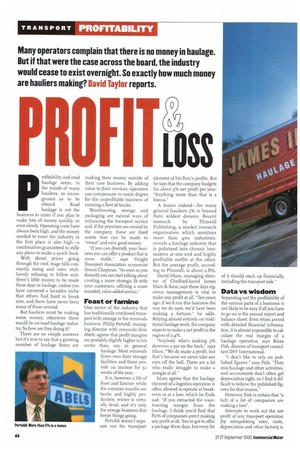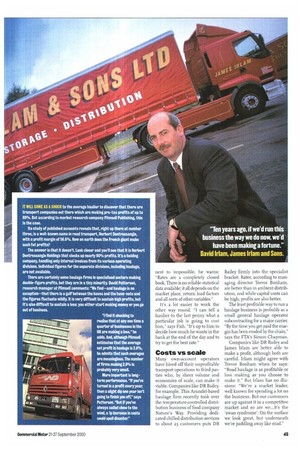F LOSS p rofitability and road haulage seem, in the minds of many hauliers, so incongruous as to be
Page 46

Page 47

If you've noticed an error in this article please click here to report it so we can fix it.
absurd. Road haulage is not the business to enter if you plan to make lots of money quickly, or even slowly. Operating costs have always been high, and the money needed to enter the industry in the first place is also high—a combination guaranteed to stifle any plans to make a quick buck.
With diesel prices going through the roof, wage bills constantly rising and rates stubbornly refusing to follow suit, there's little money to be made these days in haulage, unless you have cornered a lucrative niche that others find hard to break into, and there have never been many of those around.
But hauliers must be making some money, otherwise there would be no road haulage industry. So how are they doing it?
There are no simple answers but it's true to say that a growing number of haulage firms are
making their money outside of their core business. By adding value to their services, operators can compensate to some degree for the unprofitable business of running a fleet of trucks.
Warehousing, storage and packaging are natural ways of enhancing the transport service and, lithe premises are owned by the company, these are fixed assets that can be made to "sweat" and earn good money.
"If you can diversify your business you can offer a product that is more stable," says Freight Transport Association economist Simon Chapman. "As soon as you diversify you can start talking about creating a more strategic fit with your customers, offering a more rounded, value-added service."
Feast or farni'ne
One sector of the industry that has traditionally combined transport with storage is the removals business. Philip Pertoldi, managing director with removals firm Abets, agrees that profit margins are probably slightly higher in his sector than, say, in general haulage. Most removals firms own their storage facilities and these provide an income for 52 weeks of the year.
It is, however, a life of feast and famine: while the summer months are hectic and highly productive, winter is virtually dead, and it's only the storage business that keeps things going.
Pertoldi doesn't separate out the transport
element of his firm's profits. But he says that the company budgets for about 5% net profit per year: "Anything more than that is a bonus."
A bonus indeed—for many general hauliers 5% is beyond their wildest dreams. Recent
research by Plimsoll Publishing, a market research organisation which monitors more than 400 industries, reveals a haulage industry that is polarised into chronic lossmakers at one end and highly profitable outfits at the other. But the average profit, according to Plimsoll, is about 2.8%.
David Irlam, managing director of Chelford-based James lrlam 8c Sons, says these days rigorous management is vital to make any profit at all. "Ten years ago, if we'd run this business the way we do now, we'd have been making a fortune," he adds. Relying almost entirely on traditional haulage work, the company expects to make a net profit in the region of 3-4%.
"Anybody who's making 5% deserves a pat on the back," says Irlam. "We do make a profit, but that's because we never take our eyes off the ball. There are a lot who really struggle to make a margin at all."
Irlam agrees that the haulage element of a logistics operation is often allowed to operate at breakeven or at a loss, which he finds sad: "If you extracted the warehousing margin from the haulage, I think you'd find that 80% of companies aren't making any profit at all. You've got to offer a package these days, but every bit
of it should stack up financially, including the transport side."
Data vs wisdom
Separating out the profitability of the various parts of a business is not likely to be easy if all you have to go on is the annual report and balance sheet. Even when armed with detailed financial information, it is almost impossible to calculate the real margin of a haulage operation, says Brian Fish, director of transport consultant DFF International.
"I don't like to rely on published figures," says Fish. "They mix haulage and other activities, and accountants don't often get depreciation right, so I find it difficult to believe the published figures for that reason."
However, Fish is certain that "a hell of a lot of companies are making a loss".
Attempts to work out the net profit of any transport operation (by extrapolating rates, costs, depreciation and other factors) is
next to impossible, he warns: "Rates are a completely closed book. There is no reliable statistical data available; it all depends on the market place, return load factors and all sorts of other variables."
It's a lot easier to work the other way round. "I can tell a haulier to the last penny what a particular job is going to cost him," says Fish. "It's up to him to decide how much he wants in the bank at the end of the day and to try to get the best rate."
Costs vs scale
Many own-account operators have hived off their unprofitable transport operations to third parties who, by sheer volume and economies of scale, can make it viable. Companies like DR Bailey, for example. This Arundel-based haulage firm recently took over the temperature-controlled distribution business of food company Nature's Way. Providing dedicated chilled distribution services to about 25 customers puts DR Bailey firmly into the specialist bracket. Rates, according to managing director Trevor Bonham, are better than in ambient distribution, and while capital costs can be high, profits are also better.
The least profitable way to run a haulage business is probably as a small general haulage operator subcontracting for a major carrier. "By the time you get paid the margin has been eroded by the chain," says the FTA's Simon Chapman.
Companies like DR Bailey and James Irlam are better able to make a profit, although both are careful. Irlam might agree with Trevor Bonham when he says: "Road haulage is as profitable or loss making as you choose to make it" But Irlam has no illusions; 'We're a market leader, well known for spending a lot on the business. But our customers are up against it in a competitive market and so are we...it's the 'swan syndrome'. On the surface we look great, but underneath we're paddling away like mad."












































































































